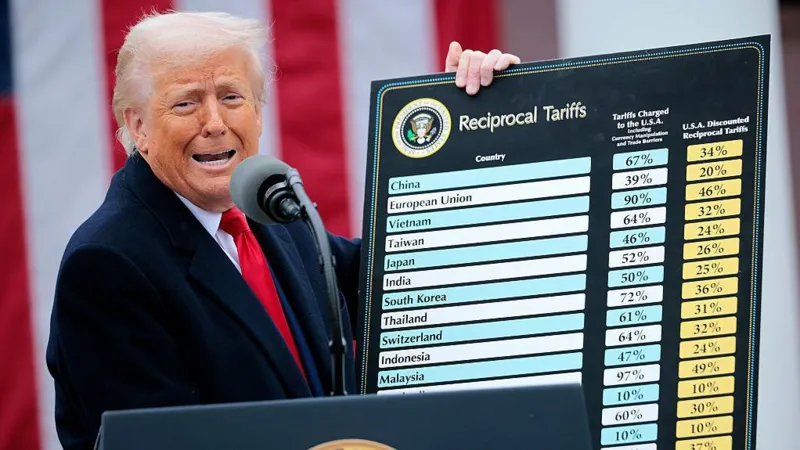The United States officially began collecting a 10% tariff on all imported goods on Saturday, marking a new phase in President Donald Trump’s aggressive trade policy. As the tariffs took effect, Trump called on Americans to “hang tough” amid stock market turmoil and growing global tension.
The tariffs are part of what the Trump administration has labeled a “baseline” strategy aimed at fixing long-standing trade imbalances. However, the policy has triggered swift backlash from countries around the world, including key allies like the United Kingdom and France. China, the hardest-hit by the tariffs, quickly announced a 34% retaliatory duty on U.S. imports and lodged a formal complaint with the World Trade Organization.
Global Markets React with Sharp Declines
The announcement of the new tariffs sent shockwaves through global financial markets. On Friday, all three major U.S. stock indexes suffered their worst single-day drop since 2020. The S&P 500 slid nearly 6%, while the Dow Jones and Nasdaq also plunged more than 5%.
The ripple effect was felt overseas. In London, the FTSE 100 dropped almost 5%, marking its sharpest decline in five years. Germany’s DAX and France’s CAC 40 recorded similar losses, and Asian markets opened lower following the U.S. announcement.
Massive Protests Across U.S. Cities
On the same day the tariffs were implemented, widespread protests erupted in major U.S. cities, including Washington D.C., New York, Los Angeles, and Chicago. Over 1,200 demonstrations took place nationwide, making it the largest day of protest against Trump’s administration since his return to office.
Protesters voiced frustration over various policies, including government spending cuts, the expansion of executive power, and the destabilizing effects of the new trade measures. The White House has not issued an official response, but President Trump was photographed holding a copy of the New York Post featuring a front-page article on China’s reaction.
China Strikes Back with Retaliatory Tariffs
China responded swiftly, announcing its own 34% tariffs on U.S. goods. Beijing’s Ministry of Commerce accused Washington of weaponizing tariffs and urged the U.S. to stop undermining China’s economic development. China’s foreign ministry emphasized the need to respect the development rights of its people and warned that continued pressure could further escalate tensions.
In addition to filing a complaint with the World Trade Organization, China is reviewing additional steps to protect its economy from further shocks, according to state-run news agencies.
European Leaders Voice Concerns, Prepare for Fallout
British Prime Minister Sir Keir Starmer and French President Emmanuel Macron held urgent talks following Trump’s tariff announcement. In a joint readout, both leaders agreed that “a trade war is in nobody’s interest” but also stressed that “nothing should be off the table.”
The European Union is set to face a 20% levy on its exports to the U.S. starting April 9. Goods from countries with high trade surpluses are expected to be hit hardest, including automotive and tech products.
In the UK, Jaguar Land Rover announced it would temporarily pause all U.S. shipments to reassess operations under the new tariffs. “We are committed to complying with new trading terms and ensuring minimal disruption to our customers,” the company said in a statement.
Musk Envisions ‘Zero-Tariff Zone’
Elon Musk, who heads the newly formed Department of Government Efficiency (Doge), expressed optimism despite the growing tension. Speaking during a visit to Italy, Musk floated the idea of a “zero-tariff zone” between North America and Europe.
“We have the potential to create the largest free-trade zone in history,” he said. “It requires bold moves and visionary leadership.”
While Musk remains a key Trump ally, his statement suggests an alternative approach to global trade, potentially laying the groundwork for future negotiations.
What’s Next?
The Trump administration is preparing to roll out even higher tariffs — up to 50% — on April 9, targeting countries labeled as “worst offenders” in trade imbalances. The policy has sparked concern among economists, who warn it could hurt American consumers through rising prices.
Despite criticism, Trump remains defiant. “This is an economic revolution,” he posted on Truth Social. “It won’t be easy, but the end result will be historic.”
As the trade landscape shifts, global leaders are scrambling to respond. Ongoing dialogue between the U.S. and its allies will determine whether the current friction leads to a full-blown trade war or opens a path to renegotiated deals.

